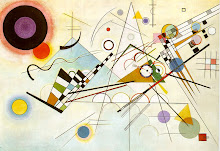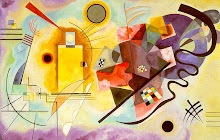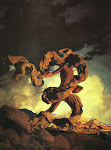Divine Love
1602
Baglione was a very able painter, but it's his interaction with one particular contemporary of his that I find to be the most interesting aspect of his life. As you can tell, there are two versions of Baglione's Divine Love in this post. The second version, which is above, was created to be in competition with Caravaggio's Love Conquers All, though both were created for the same patron, Cardinal Giustiniani. The devil in the the second version is widely believed to be based on Caravaggio himself (and, by symbolic implication, some historians see this as bearing a charge of sodomy against Caravaggio). Following the track of these historians, this representation caused Caravaggio to write and circulate a defamatory poem about Baglione soon after the painting's completion. In turn, the poem so outraged Baglione that, in 1603, he filed libel charges against Caravaggio. Baglione won the case, and Caravaggio was sent to jail for a couple of weeks. The strange story culminated, ironically, with Baglione becoming Caravaggio's first biographer (though certainly not his most sympathetic). In terms of artistic merit, I think the feud was easily settled on the side of Caravaggio; in terms of character, I'd have to second the last sentiment. What do you think?
Divine Love
1602
The Virgin and the Child with Angels
The Ecstasy of Saint Francis
1601
Saint Sebastian Healed by an Angel
1603
Self-Portrait with Vanitas Symbols













I clicked on your picture of Hemingway because, well, I was listening to his Nobel Prize acceptance speech at the time. I didn’t expect to find this little resource.
ReplyDeleteFor the treasure trove of paintings, thank you.
Mathew, thank you for the comment. It's unusual, but very pleasant, to have someone led to my blog through Hemingway's photo.
ReplyDelete